
In May of 2017, an influx of visitors crashed part of the FCC's website, and until very recently, the commission said they believed this was because of a coordinated attack by an unknown entity. It turns out that this was very much not the case. According to a report released by the FCC’s Office of Inspector General yesterday, the FCC website actually crashed because John Oliver fans submitted too many comments in response to a proposal to repeal net neutrality.
On the day of the perceived "attack," Oliver had run a segment encouraging viewers to go to the website and leave comments about repealing net neutrality. He was so serious about the campaign that he shared a link — "gofyourself.com" — that redirected to the FCC's comment website.
"One minute after the 'gofyourself.com' link was tweeted by the Last Week Tonight With John Oliver program, the FCCs Electronic Comment Filing System experienced a significant increase in the level of traffic attempting to access the system," the report reads.
FCC Chairman Ajit Pai has long maintained that the influx of traffic was the result of a hacking attack, specifically a distributed denial of service attack (DDoS). Now, the FCC is dialing back those claims.
"Our investigation did not substantiate the allegations of multiple DDoS attacks alleged,” the report says.
Earlier this summer, CBS asked Pai about accusations that the FCC was lying when it said it removed the comment section on its website because of an attack. Pai declined to give a concrete answer. "We rely on our career information technology experts as I've done for years," he said.
Pai has now blamed the mistaken allegation of hacking on the previous presidential administration.
"With respect to the report’s findings, I am deeply disappointed that the FCC’s former Chief Information Officer (CIO), who was hired by the prior Administration and is no longer with the Commission, provided inaccurate information about this incident to me, my office, Congress, and the American people," Pai said in a statement. "This is completely unacceptable. I’m also disappointed that some working under the former CIO apparently either disagreed with the information that he was presenting or had questions about it, yet didn’t feel comfortable communicating their concerns to me or my office."
Pai also appeared to address accusations that the commission had lied about how the attack happened in the first place. Specifically, he said, the report "debunks the conspiracy theory that my office or I had any knowledge that the information provided by the former CIO was inaccurate and was allowing that inaccurate information to be disseminated for political purposes."
As for net neutrality, that officially ended at the beginning of July, nearly six months after Congress voted to repeal the rules. Thus far, significant service changes related to the repeal have not been reported. However, proponents of net neutrality are still fighting for it to be reinstated, fearing that internet providers will begin to charge more for certain types of internet access, like through bundling, the way that cable access works. For now, internet access remains as it was before, though it's important to note that the rules have only been repealed for about a month.